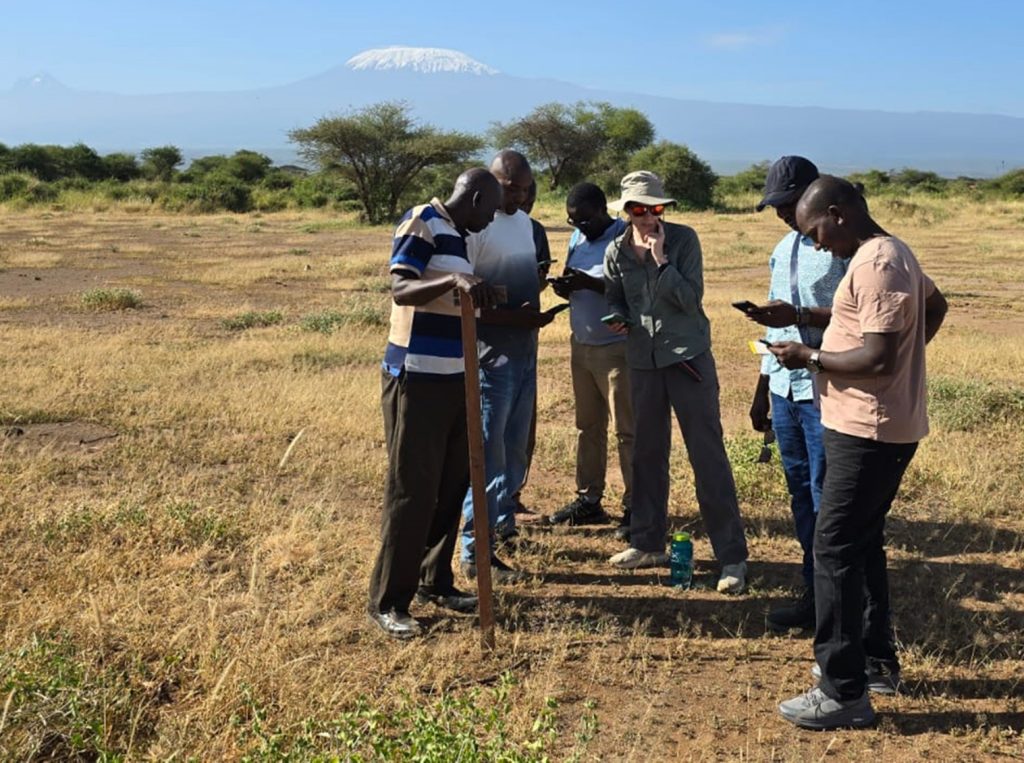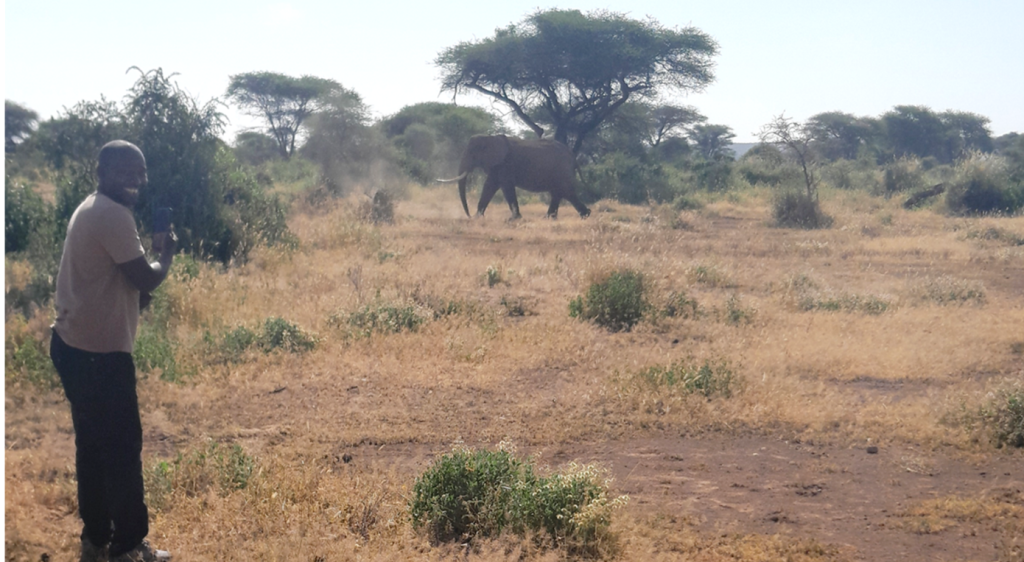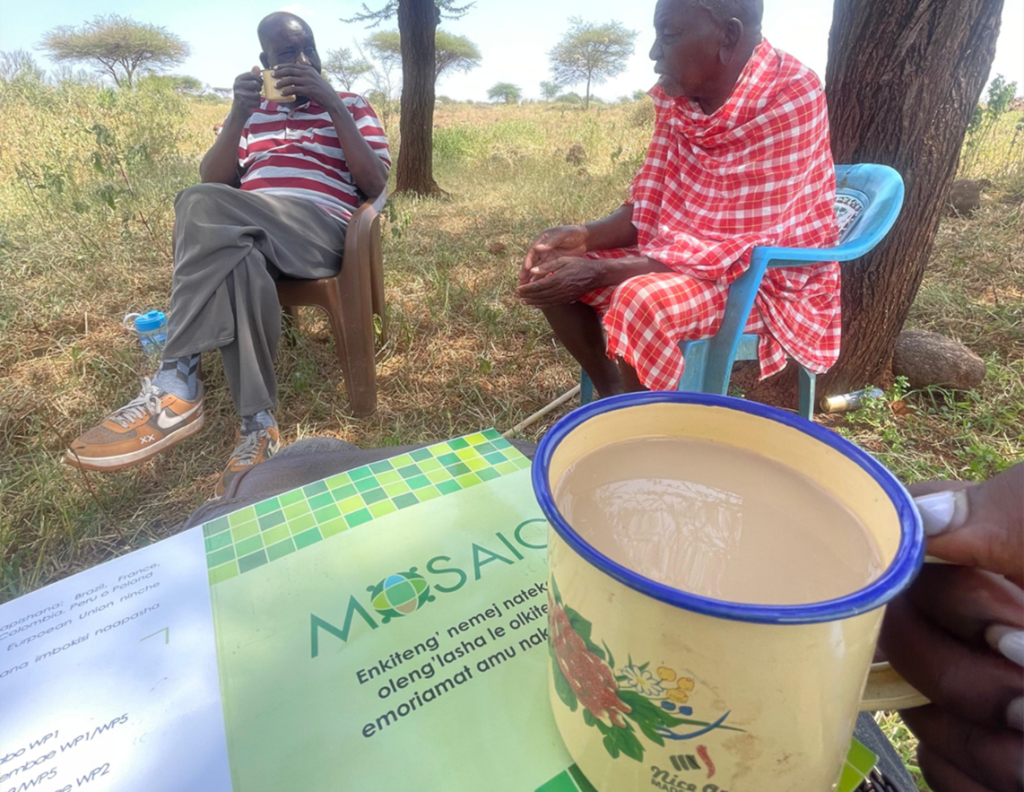Oltukai, Amboseli – A team from the Amboseli Conservation Program (ACP) and the African Conservation Centre (ACC), under Project MOSAIC, launched the One Health Questionnaire exercise last week in the Amboseli ecosystem. The survey, targeting 330 households across several group ranches, began with a session at Oltukai, where local resource assessors received training on survey techniques. The data collection is expected to take eight days to complete.
The launch also featured a team from Northern Arizona University (NAU) in the United States, who introduced the Global Ecosystem Dynamics Investigation (GEDI) instrument application, which will assist with data collection by providing valuable satellite-based environmental information. This application will complement the ground-based data being gathered by the assessors, strengthening the overall monitoring of the ecosystem’s health.

Resource assessors listen attentively as David Western presents on the importance of obtaining quality information through interviews and its connection to long-term ecological monitoring, during a training on survey techniques in Oltukai, Amboseli.
The team from NAU also announced plans to include women resource assessors in future phases of the expanded survey. This initiative strengthens the ongoing involvement of local communities in conservation and health monitoring efforts. These activities include collecting data on milk yields, animal body condition scores, market prices, among other variables.
After a visit to the Kenya Space Agency (KSA) offices in Nairobi by the ACP and NAU team, plans were announced to install a weather station at a local school in Amboseli. This initiative, a collaboration between KSA, ACC, and ACP, aims to combine satellite data with ground-based monitoring to enhance climate data accuracy and support improved ecosystem management. The project is funded under a National Aeronautics and Space Administration (NASA) grant awarded to NAU in partnership with ACP and ACC.

The ACP and NAU team visited the Kenya Space Agency (KSA) offices in Nairobi to discuss possible collaborative projects and expansion of stakeholders in addition to those identified under project MOSAIC. This partnership will be expanded to include local community groups and schools in the Amboseli ecosystem. The goal is to integrate satellite data with local efforts to improve climate monitoring and ecosystem management.

Visiting a school in the Amboseli area to evaluate a potential site for installing a weather station.
During the field demonstration, the group experienced an unexpected encounter when a lone bull elephant charged towards the participants, raising a cloud of dust and causing a moment of panic. Thankfully, no one was injured, but the incident underscored the importance of having Safety Assessors (SA) present during data collection activities in the wildlife dominated landscapes.

Field participants deeply engaged with their gadgets as they practiced using the GLOBE monitoring application by NASA, just moments before they had to scatter for safety when a lone bull elephant approached the training area.

Peter Solonka poses in relief after the elephant, which initially raised a cloud of dust and seemed poised to charge at the training site, changed course to join a nearby herd. The presence of Safety Assessors will be vital in safeguarding participants as the Resource Assessors program continues to grow.
The One Health Questionnaire exercise will continue in the coming days, with plans to analyze and share the results with the community in preparation for the upcoming seasons.

David Maitumo engages with a local community member during the MOSAIC One Health Questionnaire survey in Amboseli, sharing an afternoon cup of milk tea.
Oltukai, Amboseli – A team from the Amboseli Conservation Program (ACP) and the African Conservation Centre (ACC), under Project MOSAIC, launched the One Health Questionnaire exercise last week in the Amboseli ecosystem. The survey, targeting 330 households across several group ranches, began with a session at Oltukai, where local resource assessors received training on survey techniques. The data collection is expected to take eight days to complete.
The launch also featured a team from Northern Arizona University (NAU) in the United States, who introduced the Global Ecosystem Dynamics Investigation (GEDI) instrument application, which will assist with data collection by providing valuable satellite-based environmental information. This application will complement the ground-based data being gathered by the assessors, strengthening the overall monitoring of the ecosystem’s health.

Resource assessors listen attentively as David Western presents on the importance of obtaining quality information through interviews and its connection to long-term ecological monitoring, during a training on survey techniques in Oltukai, Amboseli.
The team from NAU also announced plans to include women resource assessors in future phases of the expanded survey. This initiative strengthens the ongoing involvement of local communities in conservation and health monitoring efforts. These activities include collecting data on milk yields, animal body condition scores, market prices, among other variables.
After a visit to the Kenya Space Agency (KSA) offices in Nairobi by the ACP and NAU team, plans were announced to install a weather station at a local school in Amboseli. This initiative, a collaboration between KSA, ACC, and ACP, aims to combine satellite data with ground-based monitoring to enhance climate data accuracy and support improved ecosystem management. The project is funded under a National Aeronautics and Space Administration (NASA) grant awarded to NAU in partnership with ACP and ACC.

The ACP and NAU team visited the Kenya Space Agency (KSA) offices in Nairobi to discuss possible collaborative projects and expansion of stakeholders in addition to those identified under project MOSAIC. This partnership will be expanded to include local community groups and schools in the Amboseli ecosystem. The goal is to integrate satellite data with local efforts to improve climate monitoring and ecosystem management.

Visiting a school in the Amboseli area to evaluate a potential site for installing a weather station.
During the field demonstration, the group experienced an unexpected encounter when a lone bull elephant charged towards the participants, raising a cloud of dust and causing a moment of panic. Thankfully, no one was injured, but the incident underscored the importance of having Safety Assessors (SA) present during data collection activities in the wildlife dominated landscapes.

Field participants deeply engaged with their gadgets as they practiced using the GLOBE monitoring application by NASA, just moments before they had to scatter for safety when a lone bull elephant approached the training area.

Peter Solonka poses in relief after the elephant, which initially raised a cloud of dust and seemed poised to charge at the training site, changed course to join a nearby herd. The presence of Safety Assessors will be vital in safeguarding participants as the Resource Assessors program continues to grow.
The One Health Questionnaire exercise will continue in the coming days, with plans to analyze and share the results with the community in preparation for the upcoming seasons.

David Maitumo engages with a local community member during the MOSAIC One Health Questionnaire survey in Amboseli, sharing an afternoon cup of milk tea.
Oltukai, Amboseli – A team from the Amboseli Conservation Program (ACP) and the African Conservation Centre (ACC), under Project MOSAIC, launched the One Health Questionnaire exercise last week in the Amboseli ecosystem. The survey, targeting 330 households across several group ranches, began with a session at Oltukai, where local resource assessors received training on survey techniques. The data collection is expected to take eight days to complete.
The launch also featured a team from Northern Arizona University (NAU) in the United States, who introduced the Global Ecosystem Dynamics Investigation (GEDI) instrument application, which will assist with data collection by providing valuable satellite-based environmental information. This application will complement the ground-based data being gathered by the assessors, strengthening the overall monitoring of the ecosystem’s health.

Resource assessors listen attentively as David Western presents on the importance of obtaining quality information through interviews and its connection to long-term ecological monitoring, during a training on survey techniques in Oltukai, Amboseli.
The team from NAU also announced plans to include women resource assessors in future phases of the expanded survey. This initiative strengthens the ongoing involvement of local communities in conservation and health monitoring efforts. These activities include collecting data on milk yields, animal body condition scores, market prices, among other variables.
After a visit to the Kenya Space Agency (KSA) offices in Nairobi by the ACP and NAU team, plans were announced to install a weather station at a local school in Amboseli. This initiative, a collaboration between KSA, ACC, and ACP, aims to combine satellite data with ground-based monitoring to enhance climate data accuracy and support improved ecosystem management. The project is funded under a National Aeronautics and Space Administration (NASA) grant awarded to NAU in partnership with ACP and ACC.

The ACP and NAU team visited the Kenya Space Agency (KSA) offices in Nairobi to discuss possible collaborative projects and expansion of stakeholders in addition to those identified under project MOSAIC. This partnership will be expanded to include local community groups and schools in the Amboseli ecosystem. The goal is to integrate satellite data with local efforts to improve climate monitoring and ecosystem management.

Visiting a school in the Amboseli area to evaluate a potential site for installing a weather station.
During the field demonstration, the group experienced an unexpected encounter when a lone bull elephant charged towards the participants, raising a cloud of dust and causing a moment of panic. Thankfully, no one was injured, but the incident underscored the importance of having Safety Assessors (SA) present during data collection activities in the wildlife dominated landscapes.

Field participants deeply engaged with their gadgets as they practiced using the GLOBE monitoring application by NASA, just moments before they had to scatter for safety when a lone bull elephant approached the training area.

Peter Solonka poses in relief after the elephant, which initially raised a cloud of dust and seemed poised to charge at the training site, changed course to join a nearby herd. The presence of Safety Assessors will be vital in safeguarding participants as the Resource Assessors program continues to grow.
The One Health Questionnaire exercise will continue in the coming days, with plans to analyze and share the results with the community in preparation for the upcoming seasons.

David Maitumo engages with a local community member during the MOSAIC One Health Questionnaire survey in Amboseli, sharing an afternoon cup of milk tea.
Oltukai, Amboseli – A team from the Amboseli Conservation Program (ACP) and the African Conservation Centre (ACC), under Project MOSAIC, launched the One Health Questionnaire exercise last week in the Amboseli ecosystem. The survey, targeting 330 households across several group ranches, began with a session at Oltukai, where local resource assessors received training on survey techniques. The data collection is expected to take eight days to complete.
The launch also featured a team from Northern Arizona University (NAU) in the United States, who introduced the Global Ecosystem Dynamics Investigation (GEDI) instrument application, which will assist with data collection by providing valuable satellite-based environmental information. This application will complement the ground-based data being gathered by the assessors, strengthening the overall monitoring of the ecosystem’s health.

Resource assessors listen attentively as David Western presents on the importance of obtaining quality information through interviews and its connection to long-term ecological monitoring, during a training on survey techniques in Oltukai, Amboseli.
The team from NAU also announced plans to include women resource assessors in future phases of the expanded survey. This initiative strengthens the ongoing involvement of local communities in conservation and health monitoring efforts. These activities include collecting data on milk yields, animal body condition scores, market prices, among other variables.
After a visit to the Kenya Space Agency (KSA) offices in Nairobi by the ACP and NAU team, plans were announced to install a weather station at a local school in Amboseli. This initiative, a collaboration between KSA, ACC, and ACP, aims to combine satellite data with ground-based monitoring to enhance climate data accuracy and support improved ecosystem management. The project is funded under a National Aeronautics and Space Administration (NASA) grant awarded to NAU in partnership with ACP and ACC.

The ACP and NAU team visited the Kenya Space Agency (KSA) offices in Nairobi to discuss possible collaborative projects and expansion of stakeholders in addition to those identified under project MOSAIC. This partnership will be expanded to include local community groups and schools in the Amboseli ecosystem. The goal is to integrate satellite data with local efforts to improve climate monitoring and ecosystem management.

Visiting a school in the Amboseli area to evaluate a potential site for installing a weather station.
During the field demonstration, the group experienced an unexpected encounter when a lone bull elephant charged towards the participants, raising a cloud of dust and causing a moment of panic. Thankfully, no one was injured, but the incident underscored the importance of having Safety Assessors (SA) present during data collection activities in the wildlife dominated landscapes.

Field participants deeply engaged with their gadgets as they practiced using the GLOBE monitoring application by NASA, just moments before they had to scatter for safety when a lone bull elephant approached the training area.

Peter Solonka poses in relief after the elephant, which initially raised a cloud of dust and seemed poised to charge at the training site, changed course to join a nearby herd. The presence of Safety Assessors will be vital in safeguarding participants as the Resource Assessors program continues to grow.
The One Health Questionnaire exercise will continue in the coming days, with plans to analyze and share the results with the community in preparation for the upcoming seasons.

David Maitumo engages with a local community member during the MOSAIC One Health Questionnaire survey in Amboseli, sharing an afternoon cup of milk tea.
Amboseli Conservation Program
P.O Box 15289-00509 or 62844-00200
Nairobi, Kenya.
Tel/Fax: +254 20 891360 / 891751
Email: acc@acc.or.ke